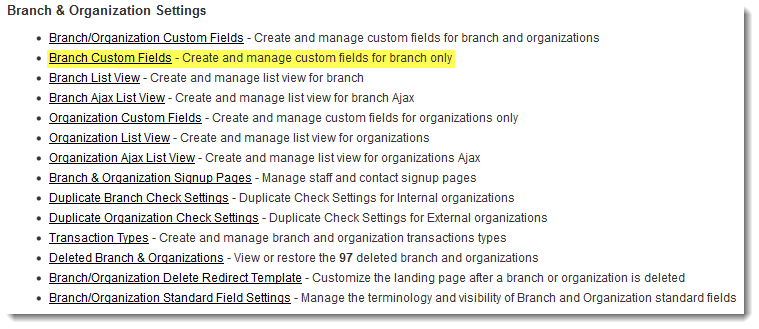Difference between revisions of "Root Company Variable"
From SmartWiki
(→Creating Root Company Variables) |
|||
| Line 2: | Line 2: | ||
* Root Company Variables have a similar utility to [[System Variables]], in that they can store information that is relevant throughout your copy of SmartSimple in a centralized location. | * Root Company Variables have a similar utility to [[System Variables]], in that they can store information that is relevant throughout your copy of SmartSimple in a centralized location. | ||
| − | * The | + | * The advantages of Root Company Variables over System Variables are: |
| + | :*Root Company Variables can have their format validated (set as date, numeric, limited values in a combo box or checkboxes, or make use of [[JavaScript Validation]]) | ||
| + | :*Access to Root Company Variables can be controlled by role permissions; only {{GUA}}s have access to edit System Variables | ||
| + | :*Root Company Variables, like other custom fields, can be organized into [[tabs]] | ||
* The advantage of System Variables is that, using the System2 syntax, you can pre-process the variable name to access different system variables based on the context (see [[System Variables#System 2|System Variables]] page for further information). | * The advantage of System Variables is that, using the System2 syntax, you can pre-process the variable name to access different system variables based on the context (see [[System Variables#System 2|System Variables]] page for further information). | ||
| Line 19: | Line 22: | ||
white-space: -pre-wrap; | white-space: -pre-wrap; | ||
white-space: -o-pre-wrap; | white-space: -o-pre-wrap; | ||
| − | word-wrap: break-word;">@companyid@=@rootcompanyid@</pre> | + | word-wrap: break-word;">"@companyid@"="@rootcompanyid@"</pre> |
* Irrespective of whether the custom field is visible on all internal company records or just the Root Company, the @rootcompany.''fieldname''@ syntax will only return the value entered into the field on the Root Company itself. | * Irrespective of whether the custom field is visible on all internal company records or just the Root Company, the @rootcompany.''fieldname''@ syntax will only return the value entered into the field on the Root Company itself. | ||
Revision as of 15:39, 6 November 2013
Root Company Variables can be referenced throughout your copy of SmartSimple using the syntax @rootcompany.fieldname@ or @rootcompany.#fieldid#@. The syntax is the same throughout the instance, irrespective of the object upon which the variable resides. In other words, the variable @rootcompany.fieldname@ will return the same value on a contact record, company record or record of any level.
- Root Company Variables have a similar utility to System Variables, in that they can store information that is relevant throughout your copy of SmartSimple in a centralized location.
- The advantages of Root Company Variables over System Variables are:
- Root Company Variables can have their format validated (set as date, numeric, limited values in a combo box or checkboxes, or make use of JavaScript Validation)
- Access to Root Company Variables can be controlled by role permissions; only Global User Administrators have access to edit System Variables
- Root Company Variables, like other custom fields, can be organized into tabs
- The advantage of System Variables is that, using the System2 syntax, you can pre-process the variable name to access different system variables based on the context (see System Variables page for further information).
Creating Root Company Variables
To create a Root Company Variable:
- Go to Global Settings
- Click on the Company Custom Fields hyperlink under Company & Account Settings (renamed to Branch & Organization Settings in below example)
- Create a custom field.
- To make the custom fields visible only on the Root Company, enter the following in the Visibility Condition of the custom field:
"@companyid@"="@rootcompanyid@"
- Irrespective of whether the custom field is visible on all internal company records or just the Root Company, the @rootcompany.fieldname@ syntax will only return the value entered into the field on the Root Company itself.
